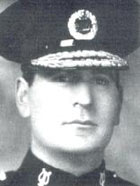Screening of Adjudicators - An opinion from 1946
14-Aug-2008Someone has always had an opinion on adjudication and the best way to do it. Back in 1946 this is what the great Frank Wright had to say...
 As always 4BR has been burrowing through the great waste paper basket of opinion that has accumulated over the years on the topic of open or closed adjudication, and has found this little gem that harks back to the year 1946.
As always 4BR has been burrowing through the great waste paper basket of opinion that has accumulated over the years on the topic of open or closed adjudication, and has found this little gem that harks back to the year 1946.
It was originally written by the great Frank Wright, and reappeared in the Regional Contest programme of 1971.
The publishers wrote: “…the article seems to be as relevant, and interesting today, as they were at the time of writing.”
See what you think…
Screening
"The screening of adjudicators is a practice adopted at band festivals not only in Great Britain, but also throughout those two other great band contesting countries, Australia and New Zealand. This long established custom probably found its origin in the early days of contesting, when adjudicators and conductors sprang from the same ‘school’.
In the screening of judges I am a fervent believer; and provided the box is reasonably comfortable, satisfactorily lighted and well aired, I enjoy working under this system.
Roughly, the procedure at contests is as follows:-
The judge (or judges) is shown into his box and then the draw is taken for the order of play. Representatives of competing bands inspect the box to make certain that nothing of the stage can be seen from within. This examination is usually the subject of a joke or two on either side.
Although segregated, and sometimes with guardians at the door, judges cannot be expected completely to suppress their sense of humour, especially when one of the officials is so diligent in his duty as to get on his hands and knees and look from under the judge’s table for possible glimpses of the stage.
With the retreating steps of the inspection party the judge, shut off from the outside world save through the medium of his ‘buzzer’, or whistle, is alone to concentrate on the job, undisturbed.
One concern
His one concern becomes the playing of the bands. Thee are no whisperers to distract his attention, no well meaning friends in the audience to catch his eye.
In his solitary state he can weigh up the various points of the playing with a clam, critical mind. He follows each performance down to the minutest detail. Be the playing of a high order or palpably bad, he can by his facial expression give no indication to an ever-watchful audience as to what are his reactions.
He can loosen his collar, take off his coat or even his shirt (as I once did when sitting for a stretch of nine hours in a tent in the sizzling heat of Queensland) without shocking the sensibilities of onlookers.
Bands to him become not names, as they would were he permitted to see them, but mere numbers. He can compare the details of number 16 with, say, 4 by turning back his notes without being watched wonderingly by the audience. He is free to ponder a performance without becoming an object of curiosity.
Why not others?
But, one may ask, why are not choral or other instrumental judges screened?
The answer is simple: Pianists, singers and violinists rarely, if ever, sit in judgement upon each other, as do band conductors.
Band contesting is unique; and the question as to whether judges should be screened will always be hotly debated. My view is that in a hundred years’ time the final word will still have to be spoken.
Those who say, remove the screens, cannot have taken into consideration either the advantages of judging under the conditions where undisturbed concentration of the mind is most easily achieved, or that tremendous force, the psychology of bandsmen."
Frank Wright:
Frank Wright was born in Ballarat in Australia in August 1901 and died in November 1970 after spending the vast part of his adult life in Great Britain.
Although initially a cornet player and conductor of some standing in his native land, it was as an arranger and composer for brass bands in the UK that he made his name.
Arrangements for many of the great orchestral overtures, numerous concert marches and works came from his pen (he was the Music Director of the London County Council Parks Department) and he later became music editor for Boosey & Hawkes.
He first adjudicated at the 1933 Australian Championships, followed by New Zealand in 1934. He was a regular adjudicator at the National Finals at the Royal Albert Hall up until the time of his death.
His final transcription for brass band was for the overture ‘Benvenuto Cellini’, used as the set work for the 1970 World Champion ship Contest at the Royal Albert Hall.















